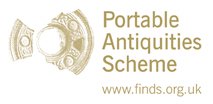Server check!
You are on the training database
Treasure Annual Report 2015
I am pleased to introduce the Treasure Act Annual Report 2015, which provides a report on the operation of the Treasure Act 1996 for that year. You can download the PDF here.
The Treasure Act is an enduring success, ensuring that museums are able to acquire the most important archaeological discoveries for the benefit of all. 2015 saw 1,005 potential Treasure finds reported in England, Wales and Northern Ireland. Of these discoveries, 341 have been (or are to be) acquired by public collections.
Many museum acquisitions have been made possible only through the kind assistance of funding bodies, particularly the Art Fund, Headley Trust, Heritage Lottery Fund, National Heritage Memorial Fund and the V&A Purchase Grant Fund. I am grateful to these organisations for their recognition of the importance of archaeological finds and their support of museums' efforts to acquire them. I also applaud the large number of interested parties waiving their right to a reward for Treasure cases, with individuals foregoing their share in 78 cases this year. These donations have allowed museums to acquire finds that they may not have otherwise been able to, thereby allowing the public to enjoy and experts to study them.
There are many bodies and people who deserve praise for the ongoing success of the Treasure Act, in particular the Portable Antiquities Scheme (PAS) and its local network of 40 Finds Liaison Officers (FLOs) across England and Wales, to whom almost all finds of Treasure are reported. The Scheme is fundamental to the operation of the Act, and on behalf of the Government I would like to thank the British Museum, its local partners, and Amgueddfa Cymru/National Museum Wales for their commitment to the success of the PAS. The role of the FLOs is vital in disseminating information about the Act and archaeological best practice to finders of Treasure and landowners. They are indispensable in facilitating the administration of Treasure cases and providing the logistical means for the Act to function. Together with curators, scientists and conservators at the national museums of England, Wales and Northern Ireland, they also provide expert reports on Treasure finds for Coroners, who, along with their staff, are owed thanks for their diligence in holding Treasure inquests. The British Museum, which manages the PAS in England, also supports coroners in that country and serves as the secretariat for the Treasure Valuation Committee and I am grateful for their continued excellent work. In order to ensure the long-term success of the Act, and that it reflects current practice and works as efficiently as possible, the Government is continuing a process to conduct a Review of the Treasure Act Code of Practice. This will also consider the definition of Treasure, and whether that should be amended.
Finally I would like to acknowledge the steadfast contribution of the Treasure Valuation Committee, chaired by Lord Renfrew of Kaimsthorn. I am grateful for the services of all of the Committee members, who voluntarily provide their time and expertise.
John Glen
Parliamentary Under Secretary of State for Arts, Heritage, and Tourism
December 2017


